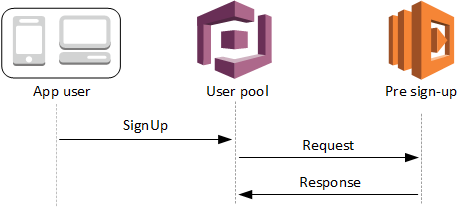AWS News Blog
Safely Validating Usernames with Amazon Cognito
|
|
Guest post by AWS Community Hero Larry Ogrodnek. Larry is an independent consultant focused on cloud architecture, DevOps, serverless, and general software development on AWS. He’s always ready to talk about AWS over coffee, and enjoys development and helping other developers.
How are users identified in your system? Username? Email? Is it important that they’re unique?
You may be surprised to learn, as I was, that in Amazon Cognito both usernames and emails are treated as case-sensitive. So “JohnSmith” is different than “johnsmith,” who is different than “jOhNSmiTh.” The same goes for email addresses—it’s even specified in the SMTP RFC that users “smith” and “Smith” may have different mailboxes. That is crazy!
I recently added custom signup validation for Amazon Cognito. In this post, let me walk you through the implementation.
The problem with uniqueness
Determining uniqueness is even more difficult than just dealing with case insensitivity. Like many of you, I’ve received emails based on Internationalized Domain Name homograph attacks. A site is registered for “example.com” but with Cyrillic character “a,” attempting to impersonate a legitimate site and collect information. This same type of attack is possible for user name registration. If I don’t check for this, someone may be able to impersonate another user on my site.
Do you have reservations?
Does my application have user-generated messages or content? Besides dealing with uniqueness, I may want to reserve certain names. For example, if I have user-editable information at user.myapp.com or myapp.com/user, what if someone registers “signup” or “faq” or “support”? What about “billing”?
It’s possible that a malicious user could impersonate my site and use it as part of an attack. Similar attacks are also possible if users have any kind of inbox or messaging. In addition to reserving usernames, I should also separate out user content to its own domain to avoid confusion. I remember GitHub reacting to something similar when it moved user pages from github.com to github.io in 2013.
James Bennet wrote about these issues in great detail in his excellent post, Let’s talk about usernames. He describes the types of validation performed in his django-registration application.
Integrating with Amazon Cognito
Okay, so now that you know a little bit more about this issue, how do I handle this with Amazon Cognito?
Well, I’m in luck, because Amazon Cognito lets me customize much of my authentication workflow with AWS Lambda triggers.
To add username or email validation, I can implement a pre-sign-up Lambda trigger, which lets me perform custom validation and accept or deny the registration request.
It’s important to note that I can’t modify the request. To perform any kind of case or name standardization (for example, forcing lower case), I have to do that on the client. I can only validate that it was done in my Lambda function. It would be handy if this was something available in the future.
To declare a sign-up as invalid, all I have to do is return an error from the Lambda function. In Python, this is as simple as raising an exception. If my validation passes, I just return the event, which already includes the fields that I need for a generic success response. Optionally, I can auto-verify some fields.
To enforce that my frontend is sending usernames standardized as lowercase, all I need is the following code:
Adding unique constraints and reservations
I’ve extracted the validation checks from django-registration into a Python module named username-validator to make it easier to perform these types of uniqueness checks in Lambda:
In addition to detecting confusing homoglyphs, it also includes a standard set of reserved names like “www”, “admin”, “root”, “security”, “robots.txt”, and so on. You can provide your own additions for application-specific reservations, as well as perform individual checks.
To add this additional validation and some custom reservations, I update the function as follows:
Now, if I attach that Lambda function to the Amazon Cognito user pool as a pre–sign-up trigger and try to sign up for “aws”, I get a 400 error. I also get some text that I could include in the signup form:  Other attributes, including email (if used) are available under event
Other attributes, including email (if used) are available under event[‘request’][‘userAttributes’]}. For example:
What’s next?
I can validate other attributes in the same way. Or, I can add other custom validation by adding additional checks and raising an exception, with a custom message if it fails.
In this post, I covered why it’s important to think about identity and uniqueness, and demonstrated how to add additional validations to user signups in Amazon Cognito.
Now you know more about controlling signup validation with a custom Lambda function. I encourage you to check out the other user pool workflow customizations that are possible with Lambda triggers.

